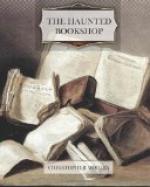An idea suddenly occurred to him, and he went over to the chair where he had thrown his overcoat the night before. From the pocket he took out the cover of Carlyle’s Cromwell, and looked at it carefully.
“I wonder what the jinx is on this book?” he thought. “It’s a queer thing the way that fellow trailed me last night—then my finding this in the drug store, and getting that crack on the bean. I wonder if that neighbourhood is a safe place for a girl to work in?”
He paced up and down the room, forgetting the pain in his head.
“Maybe I ought to tip the police off about this business,” he thought. “It looks wrong to me. But I have a hankering to work the thing out on my own. I’d have a wonderful stand-in with old man Chapman if I saved that girl from anything. . . . I’ve heard of gangs of kidnappers. . . . No, I don’t like the looks of things a little bit. I think that bookseller is half cracked, anyway. He doesn’t believe in advertising! The idea of Chapman trusting his daughter in a place like that——”
The thought of playing knight errant to something more personal and romantic than an advertising account was irresistible. “I’ll slip over to Brooklyn as soon as it gets dark this evening,” he said to himself. “I ought to be able to get a room somewhere along that street, where I can watch that bookshop without being seen, and find out what’s haunting it. I’ve got that old .22 popgun of mine that I used to use up at camp. I’ll take it along. I’d like to know more about Weintraub’s drug store, too. I didn’t fancy the map of Herr Weintraub, not at all. To tell the truth, I had no idea old man Carlyle would get mixed up in anything as interesting as this.”
He found a romantic exhilaration in packing a handbag. Pyjamas, hairbrushes, toothbrush, toothpaste—("What an ad it would be for the Chinese Paste people,” he thought, “if they knew I was taking a tube of their stuff on this adventure!")— his .22 revolver, a small green box of cartridges of the size commonly used for squirrel-shooting, a volume of O. Henry, a safety razor and adjuncts, a pad of writing paper. . . . At least six nationally advertised articles, he said to himself, enumerating his kit. He locked his bag, dressed, and went downstairs for lunch. After lunch he lay down for a rest, as his head was still very painful. But he was not able to sleep. The thought of Titania Chapman’s blue eyes and gallant little figure came between him and slumber. He could not shake off the conviction that some peril was hanging over her. Again and again he looked at his watch, rebuking the lagging dusk. At half-past four he set off for the subway. Half-way down Thirty-third Street a thought struck him. He returned to his room, got out a pair of opera glasses from his trunk, and put them in his bag.




